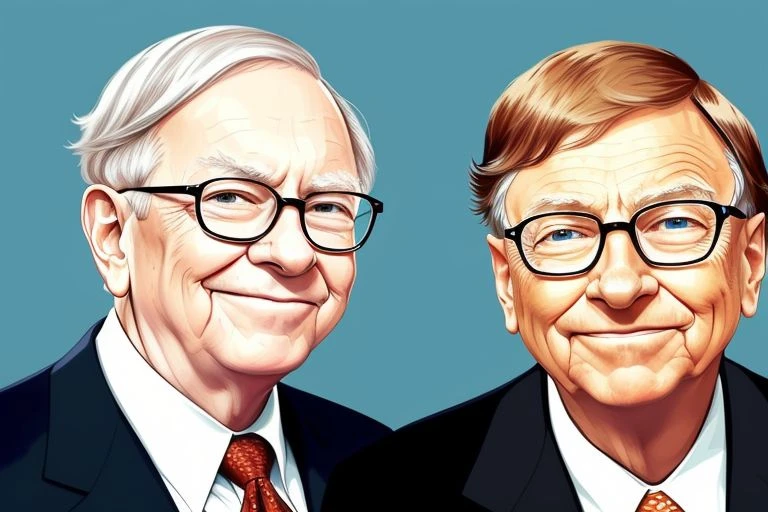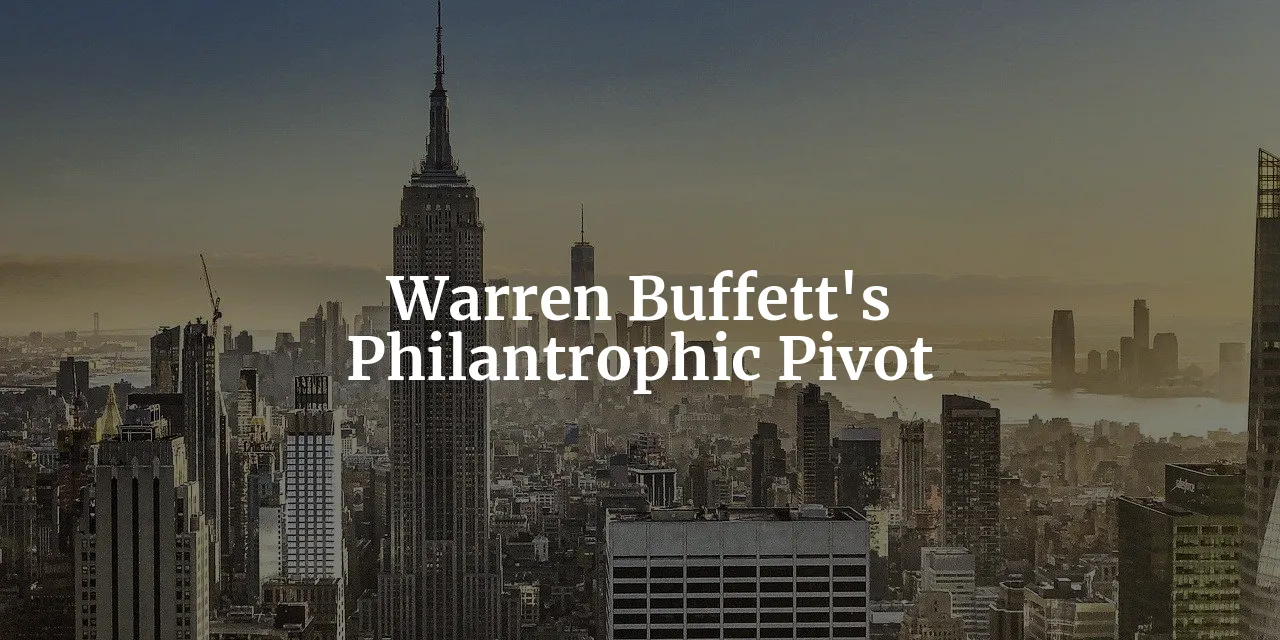Tags: Warren Buffett / Comments
This fanpage is not officially affiliated with Berkshire Hathaway: Disclaimer
There have been rumors about a breakup in the friendship between Bill Gates and Warren Buffett 1. Gates has been seen on Berkshire Hathaway's shareholder meeting 2024, which might indicate the opposite 7. Nevertheless, Warren Buffett's recent philanthropic pivot from the Gates foundation marks a transformative moment for Berkshire Hathaway - What are the implication for the company?

Introduction
The tradition of philanthropy among the wealthy is deeply rooted in history, with figures like Andrew Carnegie and John D. Rockefeller setting precedents for using personal fortunes to benefit society. Carnegie's "The Gospel of Wealth" articulated a vision where the affluent have a moral obligation to redistribute their wealth for the public good. This ethos resonates with Warren Buffett's philanthropic journey, particularly his monumental pledge to the Bill & Melinda Gates Foundation. This partnership, born from an "unbelievable friendship" between Buffett and Gates, has been a cornerstone of modern philanthropy 1.
The Gates Foundation stands as a testament to the power of concentrated philanthropic efforts, addressing global challenges in public health, poverty alleviation, and education. Its impact is unparalleled, with an annual budget exceeding that of the World Health Organization 2. Central to this narrative is Berkshire Hathaway, the conglomerate through which Buffett channeled his substantial donations, enhancing the foundation's credibility and global reach.
Instead of donating his fortune to the Bill & Melinda Gates Foundation, Warren Buffett will now be placing his estimated $144 billion estate into a charitable trust managed by his three children. They will have 10 years to allocate the money to charities of their choice 8. This means the funds will be managed collectively in one trust, rather than being divided into individual trusts for each child. Buffett's children will have the autonomy to decide how the money is distributed to philanthropic causes.
This article aims to explore the implications of Buffett's recent decision to cease donations to the Gates Foundation after his death, a move that could reshape the philanthropic landscape. For Berkshire Hathaway shareholders, this pivot presents both challenges and opportunities.
The Evolution of Buffett's Philanthropy
Warren Buffett's philanthropic ideals were shaped early on, influenced by his late wife Susan and inspired by Carnegie's philosophy of giving back during one's lifetime 1 ↗. This belief culminated in the Giving Pledge, co-founded by Buffett and Gates in 2010, urging billionaires to commit at least half their wealth to philanthropy 1. Buffett's commitment to the Gates Foundation was substantial, with over $39 billion donated between 2006 and 2023, underscoring his dedication to impactful giving 1.
However, Buffett's philanthropic strategy has evolved. Concerns over the Gates Foundation's operational efficiency and perceived risk aversion prompted a shift in focus 2. Buffett's decision to redirect his remaining fortune to his family's foundations highlights a strategic pivot, empowering his children to shape future philanthropic endeavors 1. This move reflects a broader trend among philanthropists to involve family in legacy-building efforts.
Speculation abounds regarding Buffett's motivations, with some attributing the decision to personal concerns about the foundation's direction and Gates' behavior 2. Historically, philanthropists like Rockefeller have shifted strategies, transitioning from direct donations to establishing foundations to ensure sustained impact. Buffett's pivot echoes this historical precedent, signaling a new chapter in his philanthropic journey that aligns with his core values and strategic vision.
So, Buffett's decision to part with the Gates foundations has implications for Berkshire Hathaway. Let's have a look!
Implications for Berkshire Hathaway
Warren Buffett's decision to redirect his philanthropic strategy, choosing to allocate his vast fortune to charitable trust managed by his three children Susie, Howard and Peter 8 rather than the Gates Foundation, might have significant implications for Berkshire Hathaway. This shift not only influences the future of his philanthropic legacy but also has potential consequences for Berkshire Hathaway's operations, shareholder dynamics, and market perception. Here, we explore the multifaceted implications for Berkshire Hathaway, considering various angles such as corporate governance, shareholder sentiment, market perception, and long-term strategic positioning.
Buffett's decision to pledge to a trust managed by his children introduces a new layer of complexity to Berkshire Hathaway's governance dynamics. While Buffett has been the face of Berkshire for decades, his children, will now play an even more prominent role in his legacy. This move could lead to increased scrutiny of the influence his family may exert over Berkshire, especially if they choose to align the trust's investments with Berkshire's interests. Two of Warren Buffett's children serve on the board of directors for Berkshire Hathaway:
- Howard G. Buffett - He has been a director since 1992 and is involved in various philanthropic activities through the Howard G. Buffett Foundation.
- Susan A. Buffett - "Susie" serves on the board since 2021. She has experience within her Sherwood Foundation.
- Peter A. Buffett is not part of Berkshire's board but also has philanthropic experience in frame of the NoVo Foundation
The potential for increased family influence raises questions about succession planning and the future leadership structure at Berkshire. Buffett has long emphasized the importance of a strong management team, and his decision could signal confidence in the existing leadership to maintain the company's trajectory. However, it also necessitates clear communication to shareholders about how the company's governance will evolve post-Buffett, ensuring that the transition does not lead to instability or uncertainty.
The shift in philanthropic strategy may impact shareholder sentiment, particularly among those who have invested in Berkshire due to Buffett's commitment to philanthropy and his association with the Gates Foundation. Some investors may view this decision as a departure from Buffett's previously stated intentions, potentially leading to concerns about the continuity of his values and vision for the company.
Moreover, the decision not to pledge additional Berkshire shares to the Gates Foundation means that a significant portion of Buffett's Berkshire holdings will remain within his family's control. This concentration of ownership could lead to apprehensions about potential changes in Berkshire's strategic direction or capital allocation policies, especially if the trust's objectives diverge from those of the broader shareholder base.
Berkshire Hathaway's brand image is closely tied to Buffett's reputation as a prudent investor and a committed philanthropist. The decision to redirect his fortune may prompt a reevaluation of Berkshire's brand identity, as stakeholders consider the implications of this shift for the company's social responsibility profile. While philanthropy is not a direct function of Berkshire's corporate activities, Buffett's association with the Gates Foundation has been a part of the company's narrative, reinforcing its image as a socially conscious entity.
The change in philanthropic focus could also influence market perception of Berkshire's long-term stability and strategic vision. Investors and analysts may scrutinize the potential impact on Berkshire's stock performance, particularly if the trust's investment decisions are perceived as misaligned with traditional Berkshire principles. Maintaining investor confidence will require clear communication from Berkshire's leadership about how the company intends to uphold its values and strategic priorities in the post-Buffett era.
Buffett's decision to involve his children in managing his philanthropic legacy could have strategic implications for Berkshire's long-term outlook. The trust's investment strategy, influenced by Buffett's children, might prioritize different sectors or initiatives compared to the Gates Foundation, potentially affecting Berkshire's investment portfolio and strategic direction. Bill Gates' influence on Berkshire Hathaway has evolved over time. His departure from the company's board in March 2020 marked a significant shift in their relationship 4. As Gates focuses more on his philanthropic endeavors, Berkshire may experience changes in its strategic priorities and governance dynamics.
Additionally, the decision may prompt Berkshire to reevaluate its approach to corporate social responsibility and sustainability. As stakeholders increasingly prioritize environmental, social, and governance (ESG) factors, Berkshire's alignment with these values could be scrutinized in light of the new philanthropic strategy. The company's ability to adapt and integrate these considerations into its business model will be crucial for maintaining its competitive edge and ensuring long-term success.
From a financial perspective, the decision not to pledge additional shares to the Gates Foundation could have implications for Berkshire's capital structure and risk management strategies. With a significant portion of Buffett's shares remaining within the family, there may be concerns about liquidity and potential volatility in Berkshire's stock price, particularly if the trust decides to make substantial changes to its holdings.
Berkshire's management is however unlikely to proactively address these concerns by implementing further risk management practices, as the company is financially in fantastic shape with significant cash reserves 56 ↗. Warren Buffett's decision to redirect his philanthropic efforts from the Gates Foundation to trusts managed by his children has profound implications for Berkshire Hathaway. The move introduces new dynamics in corporate governance, shareholder sentiment, market perception, strategic positioning, and financial management. As Berkshire experiences this transition, clear communication, strong leadership, and a commitment to its core values will be essential in maintaining investor confidence and ensuring the company's continued success in the post-Buffett era ↗.
The Broader Philanthropic Landscape
The broader philanthropic landscape is undergoing a transformation, with the Gates Foundation at the center of several key developments:
Comparative Analysis: The Gates Foundation, with assets totaling $77 billion, remains a dominant force in global philanthropy. However, it faces competition from other major organizations, such as the Ford and Rockefeller foundations 2. These entities, each with their unique focus, contribute to a diverse philanthropic ecosystem.
Global Philanthropic Trends: Increasing scrutiny of large foundations has led to calls for greater transparency and accountability. As the philanthropic sector evolves, there is a growing demand for measurable impact and responsible stewardship of resources.
The Role of Billionaires in Philanthropy: Billionaires like Warren Buffett and Bill Gates have reshaped the philanthropic landscape, leveraging their wealth to address pressing global issues. This trend reflects a historical pattern where individuals of immense means, akin to Andrew Carnegie, have sought to leave a lasting legacy through strategic giving.
Critiques and Controversies: The Gates Foundation has faced critiques, including accusations of neocolonial practices and concerns about Bill Gates' personal controversies 1. These issues highlight the challenges large foundations encounter in balancing influence with ethical considerations.
Future of the Gates Foundation: With Buffett's cessation of donations and Melinda Gates' departure, the foundation faces potential challenges in sustaining its impact 3. Its future direction will likely involve reassessing priorities and adapting to new leadership dynamics.
Enumeration of Key Philanthropic Initiatives: The Gates Foundation has achieved significant milestones, including advancements in vaccines, public health, and poverty alleviation. Its focus on digital accounts for the unbanked and gender equality underscores its commitment to addressing systemic inequalities. These initiatives have positioned the foundation as a leader in global philanthropy, despite the challenges it faces.
In this sense, Warren Buffett's philanthropic pivot signals a new chapter for both Berkshire Hathaway and the broader philanthropic landscape.

Conclusion
Warren Buffett's recent philanthropic pivot marks a significant turning point not only for his personal legacy but also for Berkshire Hathaway and the broader landscape of global philanthropy. As we have explored, this decision to cease donations to the Bill & Melinda Gates Foundation after his passing carries profound implications. It reflects a shift in Buffett's approach to philanthropy, emphasizing family involvement and a desire for more personalized charitable efforts, reminiscent of historical figures like Andrew Carnegie who championed the idea of tailored giving.
The implications for Berkshire Hathaway are multifaceted. Shareholders may experience shifts in perception regarding the company's commitment to corporate social responsibility, as Buffett's long-standing relationship with the Gates Foundation has been a pillar of its philanthropic identity. In the long term, this transition could lead to significant changes in corporate strategy and shareholder expectations. As Berkshire Hathaway navigates this new landscape, the company must remain vigilant in its approach to philanthropy, ensuring that its efforts resonate with stakeholders and reflect a commitment to addressing pressing global challenges. The leadership transition that will inevitably follow Buffett's departure will be crucial in determining how these philanthropic strategies evolve, as new leaders may bring fresh perspectives on corporate responsibility and community engagement.
Buffett's enduring legacy as a philanthropist and business leader will undoubtedly shape both his personal narrative and that of Berkshire Hathaway. His commitment to impactful giving has set a high standard for future generations of philanthropists, reinforcing the notion that wealth carries with it a moral obligation to contribute to the greater good. As shareholders, it is essential to engage with the company's evolving strategy and consider the broader implications of its philanthropic decisions, fostering a culture of accountability and transparency.
Reflecting on the historical significance of Buffett's philanthropic journey, we can draw parallels with other iconic figures in business and philanthropy. Just as Carnegie and Rockefeller transformed their fortunes into vehicles for societal benefit, Buffett's shift in focus signals a potential reimagining of how wealth can be utilized for social change.
Looking ahead, speculation about future developments at Berkshire Hathaway is warranted. The role of new leadership will be pivotal in redefining the company's philanthropic vision and ensuring that it continues to adapt to the changing landscape of global philanthropy. As we witness these shifts, we invite shareholders and readers alike to share their thoughts and perspectives on the future of philanthropy and corporate responsibility. Engaging in this dialogue will not only enrich our understanding of these dynamics but also help shape the path forward for Berkshire Hathaway and its commitment to making a meaningful impact in the world.
References
-
Has the Long Friendship of Bill Gates and Warren Buffett Reached Its Final Act? - www.nytimes.com ↩↩↩↩↩↩↩
-
Warren Buffett’s friendship with Bill Gates has soured. What that means for the $77 billion Gates Foundation - finance.yahoo.com ↩↩↩↩
-
Breakingviews - Warren Buffett’s legacy is at stake via Bill Gates - www.reuters.com ↩
-
Bill Gates Stepping Down From Microsoft’s Board (Published 2020) - www.nytimes.com ↩
-
Berkshire Hathaway: Continued Equity Divestitures Signal Uncertainty - seekingalpha.com ↩
-
Why Warren Buffett's record $189 billion cash pile isn't the market-crash signal some say it is - markets.businessinsider.com ↩
-
Ketemu Warren Buffett Dan Bill Gates Di Berkshire Hathaway Annual Shareholders Meeting 2024 - www.youtube.com
↩
Bill Gates At Berkshire Annual Meeting 2024, Screenshot from the source -
The next generation of Buffetts is poised to become one of the biggest forces in philanthropy - apnews.com ↩↩












